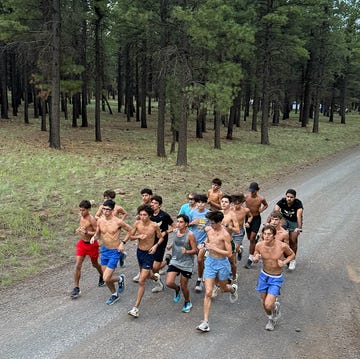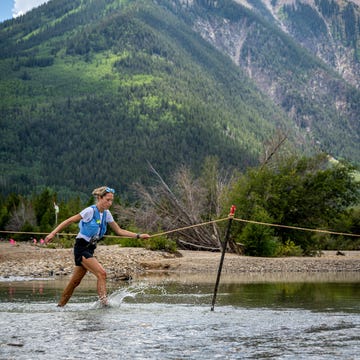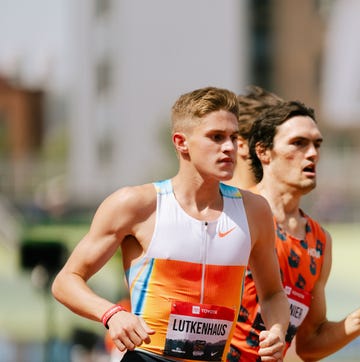Noah Lyles and NFL star Tyreek Hill have finally agreed to race each other after years of back-and-forth banter about who is faster.
Lyles—the reigning 100-meter Olympic champion and the American record holder in the 200 meters—will line up against Hill, an All-Pro wide receiver for the Miami Dolphins who was one of the top sprinters in the country during high school.
The details are fuzzy: Both athletes spoke to People to reveal the news, but there’s no decision on the race distance or location, and the only timeline is “sometime this spring or summer before Lyles competes in the U.S. Championships this July.”
Last October, Ad Age announced that Lyles and Hill would face off in 2025 in a race put on by Super Serious, a creative agency co-founded by actor Terry Crews. The company is the production partner for Duael—a new head-to-head racing circuit that promises impressive prize money, which Lyles is signed to. Again, details were sparse.
But the details don’t really matter. Barring some kind of handicap for Hill, Lyles should win, no matter the distance. Track fans know this. There’s a difference between being one of the fastest athletes in football—a sport where speed is certainly an element— and track, where speed is the only element.
To Hill’s credit, he has track pedigree. During his senior year of high school in 2013, he ran 10.19 in the 100 meters and 20.14 in the 200—the second-fastest high school time ever. He medaled at the World Junior Championships and was an All-American during indoor track his freshman year at Oklahoma State. His last race, however, was 11 years ago. It’s been a while.
That’s why Lyles is making a mistake by agreeing to race. He has everything to lose.
Here are a few scenarios of what could happen and what the response from the sports world would be.
Lyles wins comfortably: “Of course he won. He’s the Olympic champion. It would have been embarrassing if he didn’t.”
Lyles wins, but the race is close: “How does Noah almost get beat by someone who doesn’t even run track?”
Hill wins, by any amount: “Noah is a fraud. Track runners aren’t real athletes.”
I’m confident in these reactions because, well, we’ve already seen a similar thing play out when Lyles raced the mega-popular YouTuber, IShowSpeed, in November.
Lyles and “Speed” raced over 50 meters at an unofficial exhibition hosted by MrBeast. The race started out close, then Lyles pulled ahead, playfully taunting Speed in the final meters. But here’s the problem. To the naked eye (i.e., to many of the millions of people who watched the video) the race looked pretty close. Track fans knew Noah had it in the bag, but Speed wasn’t far behind.
(The race starts at the 21:00 mark.)
“Speed barely lost against the olympic champion, straight after a 3 hour drive,” one commenter posted. “That’s impressive. Huge W.”
“Speed not getting smoked was actually impressive,” wrote another.
Fifty meters doesn’t leave much room to create a noticeable gap. And while we don’t know the distance for the Lyles-Hill showdown, both have indicated that it will likely be between 40 yards (Hill’s preferred distance) and 100 meters (Lyles’s suggestion). Unless someone stumbles, the race should appear pretty close to the casual observer’s eye.
Breaking the mold
Lyles has done a good job at marketing himself beyond track and field. He’s plugged himself into the fashion world, amassed a large Instagram following, and was one of the poster boys for Team USA last summer.
But track and field has never been able to amount consistent attention in the U.S. like football, basketball, or baseball. It’s frustrating for track fans that Lyles, who has reached the pinnacle of the sport, is still not a household name outside of an Olympic year.
I commend Lyles for trying to break out of niche circles—and he’s arguably the most well-known name in the sport—but challenging someone like Hill isn’t the way to do it. Lyles doesn’t need to prove himself against a more mainstream athlete. Sure, it will likely draw new eyes to himself and the sport, and he may show that track athletes are faster than football players. But that’s to be expected, especially from the Olympic champ.
Let’s not forget, too, that Hill pleaded guilty to assaulting his pregnant girlfriend while in college. He’s not someone to put on a pedestal.
It’s also highly unlikely that the viewers of the exhibition will turn into track fans. As Michael Johnson put it when he was unveiling his new race series, Grand Slam Track, last summer: “We don’t need gimmicks. This sport is amazing as it is—people racing, who’s the fastest.”
In effect, the rivalry between Lyles and Hill has felt oddly one sided. Sure, Hill has quipped that he could beat Lyles after Lyles won gold in Paris, and in 2022, Hill awkwardly challenged Usain Bolt to a race (which never happened). But Lyles keeps stirring the pot.
At the New Balance Grand Prix on February 2, Lyles won the 60 meters. Soon after he finished, he ripped off his race bib and flipped it around for the cameras to see. On the back, it read: “Tyreek could never.”
Some may interpret it as building anticipation for the showdown. But it felt forced.
Lyles needs the race to happen more than Hill.
But Hill is the one with nothing to lose.
Theo Kahler is the news editor at Runner’s World. He’s a former all-conference collegiate runner at Winthrop University, and he received his master’s degree in liberal arts studies from Wake Forest University, where he was a member of one of the top distance-running teams in the NCAA. Kahler has reported on the ground at major events such as the Paris Olympics, U.S. Olympic Trials, New York City Marathon, and Boston Marathon. He’s run 14:20 in the 5K, 1:05:36 in the half marathon, and enjoys spotting tracks from the sky on airplanes. (Look for colorful ovals around football fields.)














